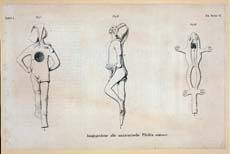 |
 |
 |
 Health & Beauty | January 2007 Health & Beauty | January 2007  
Can Mexico Fight its National Nicotine Craving?
 Edward M. Gomez - SFGate.com Edward M. Gomez - SFGate.com


| | Mexico's smoking habit is centuries-old: Antique Mexican pipes, one human-shaped and one frog-shaped. (New York Public Library Digital Gallery) | 
| | Smoking-treatment expert Dr. Guadalupe Ponciano Rodríguez helped present the "Tabacómetro" survey data. (E.M.Gomez/S.F.Gate) |
Observant travelers know that Mexico, France, Italy, Japan and China are some of the most (cough!) smoke-filled countries on the planet (choke!). In recent years, the Paris subway system has banned smoking in its stations, and, starting tomorrow, French workplaces, hospitals, schools and stores will prohibit smoking. Next year, that ban will be extended to include restaurants, cafés, nightclubs, casinos and bars throughout France.

Mexico is way behind in such government-enforced, smoking-prevention efforts, and also behind countries like the U.S. or Britain in public-information campaigns to warn about the dangers of smoking and to urge smokers to quit.

Today, though, in an attempt to persuade the media to begin seriously educating Mexico's masses about smoking as an urgent, public-health crisis, De la Riva Investigación Estrategica has released the results of the first-ever survey of Mexican smokers' habits and their effects on their own health and that of non-smokers. The private research organization's recently completed survey, titled "Tabacómetro," was funded by the Mexican branch of Pfizer, the international pharmaceutical giant.

At a press conference in the Mexican capital this morning, where she helped present the survey's findings, Dr. Guadalupe Ponciano Rodríguez said: "We have to change our attitude about smoking; we have to start building an anti-smoking culture." Ponciano Rodríguez is associated with a special clinic for the treatment of smokers within the faculty of medicine at the national university in Mexico City. Among her alarming observations: Each day, 163 people die in Mexico from illnesses related to smoking; today, 26.4 percent of Mexicans are regular smokers; and fully one-half of the country's population is made up of passive smokers who are every bit as vulnerable to the dangers of toxin-filled cigarette or cigar smoke as those who are actually doing the deadly puffing.

Worse, for Mexico's state-sponsored, public-health system, is the fact that millions of teenagers are regular smokers; often, children start smoking when they're only ten years old. "Nicotine is one of the most addicitve drugs, even more addictive than cocaine," Ponciano Rodríguez observed. Looking ahead, if current Mexican smoking trends prevail, hospitals and the public-health system will be increasingly burdened with caring for patients who suffer from smoking-related diseases.

From the smoking survey's fine print: Overall in Mexico, 42 percent of smoker respondents said they had tried to break the habit. Eighty-four percent said they were aware that their habit affected other people around them, but at least in the southern city of Mérida, 40 percent of smoker respondents pointed out that, routinely, they never bother to ask those around them if their lighting up may annoy them or not. Conversely, reflecting a kind of grin-and-breathe-it approach to bothersome cigarette smoke that appears to be part of a dominant, cultural attitude, Mexican non-smokers in the survey indicated that, although they overwhelmingly prefer smoke-free places, they are generally reluctant to ask nearby smokers not to light up or to extinguish their cigarettes.

As bad as Mexico's smoking problem is today, Mexican non-smokers and public-health officials may find some small consolation in the fact that China's is worse. In the People's Republic, 70 percent of all men are regular smokers. | 
 | |
 |



